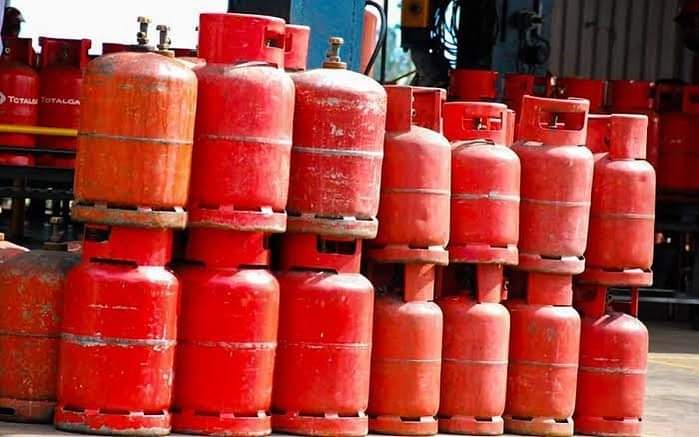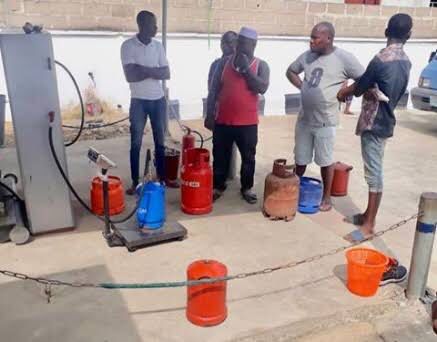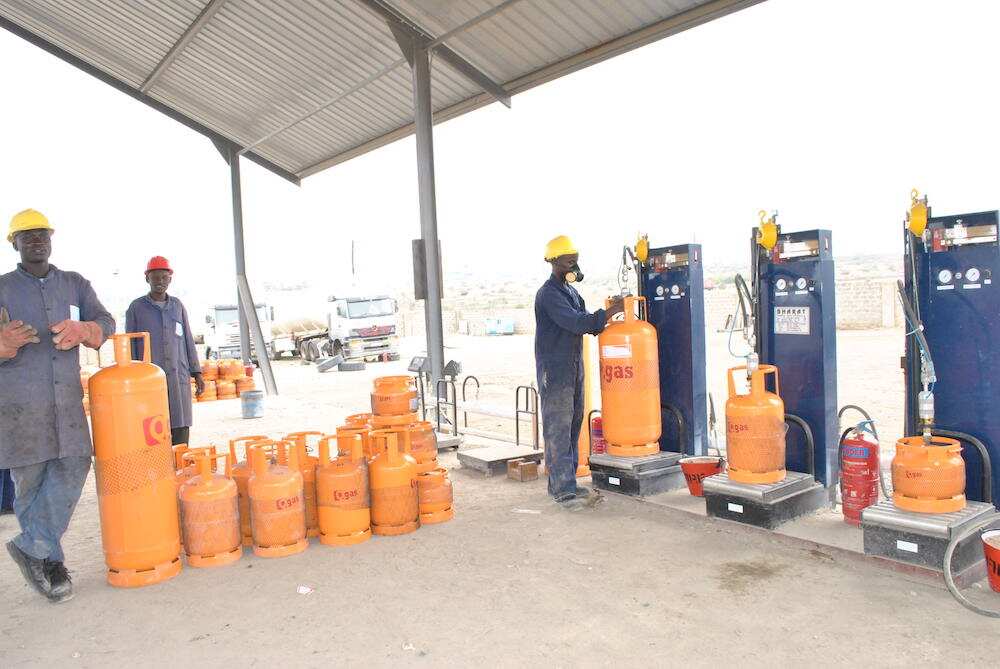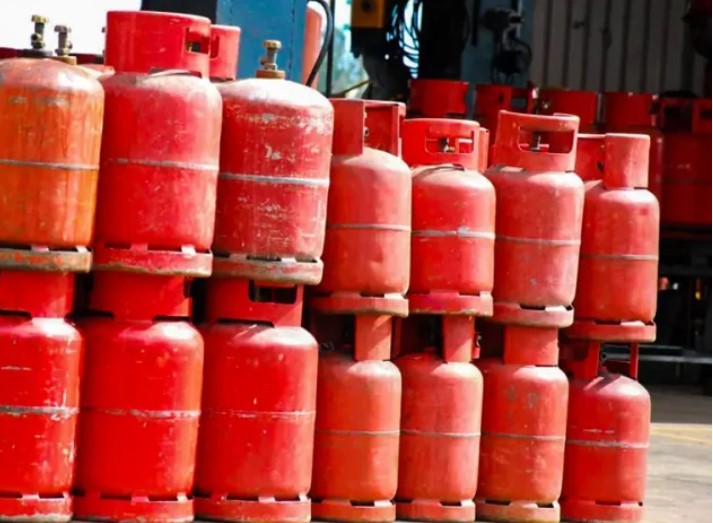Recent reports released by the National Bureau of Statistics (NBS) indicate that the average price of cooking gas, kerosene and petrol continue to rise across the country.
The average price of 5kg cooking gas increased from N6,521.58 recorded in April 2024 to N7,418.45 in May 2024, according to the NBS.
This is contained in the Bureau’s “Cooking Gas Price Watch’’ for May 2024 released on Wednesday in Abuja.
The report said the May price represented a 13.75 per cent increase, compared to what was obtained in April 2024.
The NBS said the average price of 5kg cooking gas increased on a year-on-year basis by 70.12 per cent from N4,360.69 recorded in May 2023 to N7,418.45 in May 2024.
On state profile analysis, the report showed that Benue recorded the highest average price at N8,012.03, followed by Enugu at NN7,926.21, and Ondo at N7,857.53.
It said on the other hand, Yobe recorded the lowest price at N5,842.31 followed by Jigawa and Katsina at N6,521.81, respectively.
Analysis by zone showed that the South-East recorded the highest average retail price of 5kg cooking gas at N7,680.87 , followed by the South-West at N6,593.93.
“The North-East recorded the lowest average retail price at N7,071.84,” the NBS said.
Also, the NBS said the average retail price for refilling a 12.5kg cooking gas declined by 0.07 per cent on a month-on-month basis from N15,637.74 in April 2024 to N15,627.40 in May 2024.
The report said the average retail price for 12.5kg cooking gas rose by 63.85 per cent on a year-on-year basis from N9,537.89 May 2023 to N15,627.40 in May 2024.
State profile analysis showed that Zamfara recorded the highest average retail price of N18,369.33, followed by Bayelsa at N17,772.21 and Abia at N17,538.02.
On the other hand, the report showed that the lowest average price was recorded in Bauchi at N13,076.43, followed by Ebonyi and Taraba at N13,788.09 and N13,860.3, respectively.
Analysis by zone showed that the South-South recorded the highest average retail price of 12.5kg cooking gas at N16,310.02 , followed by the North-West at N15,991.13.
The report said the North-East recorded the lowest price at N15,010.62
For kerosene, the NBS said the average retail price of a litre of the commodity increased from N1,439.64 recorded in April 2024 to N1,450.35 in May 2024.
The Bureau said this in its Kerosene Price Watch for May 2024, released in Abuja on Wednesday.
It said the May price of N1,450.35 represented a 0.74 per cent increase compared to what was obtained in April 2024 at N1,439.64
The report said the average price per litre of kerosene increased on a year-on-year basis by 20.26 per cent from N1,206.05 recorded in May 2023 to N1,450.35 in May 2024.
On state profile analysis, the report showed that Benue recorded the highest average price of N1,790.92, followed by Kaduna at N1,769.65 and Cross River at N1,722.94.
“On the other hand, the lowest price was recorded in Katsina at N1,230.81, followed by Kwara at N1,260.07 and Jigawa at N1,263.91.”
The NBS said the analysis further showed that the North-Central recorded the highest average retail price per litre of Kerosene at N1,534.12, followed by the South-West at N1,488.97.
It said the North-East recorded the lowest average retail price per litre of kerosene at N1,408.41.
The report said the average retail price per gallon of Kerosene paid by consumers in May 2024, was N5,196.69, indicating a 0.43 per cent increase from the N5,174.23 in April 2024.
“On a year-on-year basis, the average price per gallon of kerosene increased by 23.49 per cent from N4,208.27 recorded in May 2023.
On state profile analysis, it showed that Kano recorded the highest average retail price at N6,900.28, followed by Adamawa at N6,295.63 and Yobe at N6,140.17.
On the other hand, the report said Kwara recorded the lowest price at N4,235.42, followed by Delta and Akwa Ibom at N4,320.39 and N4,362.81, respectively.
Analysis by zone showed that the North-East recorded the highest average price per gallon of Kerosene at N5,951.06, followed by the North- West at N5,560.03.
“The North-Central recorded the lowest average price per gallon of kerosene at N4,659.73 ,” the NBS said.
Similarly for petrol, the NBS disclosed that the average retail price of a litre of the commodity increased from N238.11 in May 2023 to N769.62 in May 2024.
It made the declaration in its Petrol Price Watch for May 2024 released in Abuja on Wednesday.
It stated that the May 2024 price of N769.62 represented a 223.21 per cent increase over the price of N238.11 recorded in May 2023.
“Comparing the average price value with the previous month of April, the average retail price increased by 9.75 per cent from N701.24.
“On state profiles analysis, Jigawa paid the highest average retail price of N937.50 per litre, followed by Ondo and Benue at N882.67 and N882.22, respectively.
“Conversely, Lagos, Niger and Kwara paid the lowest average retail price at N636.80, N642.16 and N645.15, respectively,’’ it stated.
Analysis by zones showed that the North-West Zone recorded the highest average retail price in May 2024 at N845.26, while the North-Central recorded the lowest price of N695.04 per litre.
The NBS also stated in its Diesel Price Watch Report for May 2024 that the average retail price was N1,403.96 per litre.
It said that the May 2024 price of N1,403.96 per litre amounted to a 66.29 per cent increase over the N844.28 per litre paid in May 2023
“On a month-on-month basis, the price increased by 0.78 per cent from the N1,415.06 per litre recorded in April 2024,’’ it added.
On state profile analysis, the report said the highest average price of diesel in May 2024 was recorded in Adamawa at N1709.00 per litre, followed by Sokoto at N1675.00 and Bauchi at N1657.92.
On the other hand, the lowest price was recorded in Niger at N1,140.20 per litre, followed by Kano at N1153.33 and Oyo at N1236.92.
In addition, the analysis by zones showed that the North-East Zone had the highest price of N1,605.91 per litre, while the South-West recorded the lowest price at N1,303.60 per litre.





